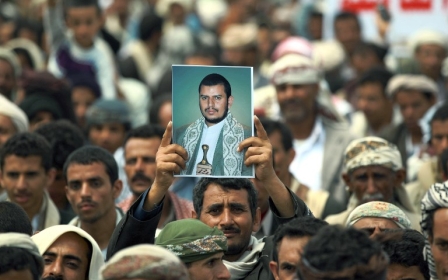Political disputes delay formation of Yemen cabinet

Houthi rebels stormed the headquarters of the Interior Ministry in Yemen’s capital of Sana’a on Wednesday and expelled employees from their offices, a security source told media.
"The Houthi militants arrived in two cars to the ministry's premises on Airport Street in northern Sana’a and stormed it," the source told Anadolu Agency on condition of anonymity.
"The Houthis broke into several offices, including that of Ministry Undersecretary for Financial Affairs, Mohamed al-Sherafi, and expelled his employees."
No immediate comment could be obtained from the Houthi group on the reported intrusion.
The reported incident comes as the government failed to meet a deadline to announce the formation of the new cabinet.
According to Al-Jazeera sources, under the latest proposals, Houthi loyalists and southern secessionists will get six seats each, while members of the General People's Congress - the party of former president Ali Abdullah Saleh - will get nine.
The Joint Meeting Parties (JMP), an umbrella of opposition groups that dominated the old government, and includes the Muslim Brotherhood affiliated Islah Party, will also get nine. If this redistribution of ministries is confirmed, it would be a massive shakeup that would see the JMP's influence severely curtailed and the Houthis emerge as potential kingmakers.
Further divisions also emerged about the extent of presidential power, with the General People's Congress and Houthis apparently refusing to allow President Abd Rabbuh Mansour Hadi to appoint key ministries, such as interior and foreign affairs.
The National Dialogue Conference, which took place earlier this year, had proposed to grant Hadi such powers, with the JMP insisting that any new deal stick to the recommendations, parliamentary sources told Anadolu.
On Tuesday, anti-Houti protesters took to the streets of Sana’a to demand that the Houthis withdraw from the capital. The Houthis took over the capital on 21 September by storming key ministries and government institutions and also sealing off key roads. The subsequent peace agreement signed with Hadi promised economic concessions and called for the Houthis to withdraw from the capital and the formation of the new cabinet.
Since the agreement, however, the Houthis have continued their advance, keeping loyal gunmen in the capital, and also expanding their presence in central and south-western Yemen. Last week, they managed to taken control of the key port city of Hodayda, and yesterday reports emerged that the rebels had taken at least partial control of Hajja, a border governorate with Saudi Arabia. An as yet unconfirmed Al Arabiya report suggested that the whole province had fallen to the rebels with apparently no resistance.
Further south, the Houthis have moved into the Ibb and Baya provinces where they have been clashing heavily with al-Qaeda in recent days, with 68 Houthi fighters reported dead in Bayda yesterday, and a further 60 killed today, according to al-Jazeera.
The governorate’s Rada’a has also become a hotspot for the fighting, with Anadolu Agency (AA) reporting heavy fighting on Tuesday morning.
A number of eyewitnesses told Andalou that several armoured vehicles belonging to the Houthis had arrived in Rada'a from the northern Dhamar province late on Tuesday and were fortifying their presence in preparation for future clashes.
Four soldiers, including a senior army officer, were reportedly killed in the fighting, with authorities blaming the Houthi rebels.
"An army commander and three soldiers were killed by Houthi militants in Rada'a city," the official, who spoke on the condition of anonymity, told Andalou.
The official said the commander was killed due to his "neutral" stance on ongoing fighting between Houthi forces and al-Qaeda militants in the city.
Some 100km west, al-Qaeda fighters were also reportedly shoring up their positions in the Odain district, hoping to stop the Houthis from advancing further into the Ibb governorate, al-Jazeera reported.
On Wednesday, Houthis killed an Ansar al-Sharia commander Anas al-Salami - known for his links to al-Qaeda and his strongly worded support for Islamic State - after his group tried to attack a Houthi checkpoint in Bayda.
Separate reports also emerged earlier in the day that the Houthis had arrested a senior al-Qaeda in the Arab Peninsula (AQAP) leader, Qassim al-Raymi who has long been wanted by the Saudis and the Americans. However, both local Houthi sources and AQAP have so far refused to confirm these reports, with confusion continuing over whether Raymi had in fact been detained.
Stay informed with MEE's newsletters
Sign up to get the latest alerts, insights and analysis, starting with Turkey Unpacked
Middle East Eye delivers independent and unrivalled coverage and analysis of the Middle East, North Africa and beyond. To learn more about republishing this content and the associated fees, please fill out this form. More about MEE can be found here.





